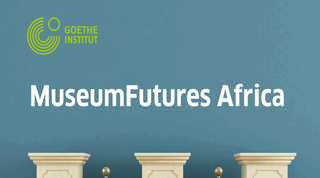Museum Futures- Africa
Press Release-10 May 2021
MuseumFutures Africa – Re-Imagining what an African Museum experience could look like
MuseumFutures Africa is a Pan-African project established to support the conceptual development of museums throughout the African continent. Spearheaded by the Goethe-Institut and a team of practitioners from the art and museum fields, the project was conceived in culmination of a series of ‘Museum Conversations’ in 2019, as a means of mobilizing museum driven processes of innovation, transformation and adaptation.
After an Africa-wide call for applications, a steering committee selected six museums that are characterized by their particular drive to innovate and the commitment to cooperation. The selection also geographically reflects the diverse museum landscape on the continent.
The six participating museums are:
Musée Théodore Monod IFAN Université Cheikh Anta Diop – Dakar, Senegal: IFAN was founded in 1936 as the "Institut français d’Afrique Noir". After independence, IFAN established itself in Dakar as one of the world's most prestigious institutions for research into African culture.
Musée National – Conakry, Guinea: The National Museum of Guinea houses a collection of local objects that represent the country's different ethnic groups. Religious artifacts as well as art and everyday objects are exhibited.
National Museums of Kenya – Nairobi, Kenya: The National Museums of Kenya bring together various museums, sites and monuments that combine a considerable number of exhibitions, from art to natural history and ethnological artifacts.
Steve Biko Centre – King Williams Town, South Africa: The privately run Steve Biko Centre is dedicated to the legacy of the anti-apartheid activist Bantu Stephen Biko, murdered in detention and whose thought leadership was instrumental in establishing the Black Consciousness Movement.
Uganda Museum – Kampala, Uganda: As Uganda's largest museum, the Uganda Museum has a variety of different exhibitions that mainly deal with the various ethnic groups of Uganda from an anthropological point of view.
Yemisi Shyllon Museum of Art, Pan-Atlantic University – Lekki, Nigeria: As part of the Pan-Atlantic University, the Yemisi Shyllon Museum of Art is dedicated to the African arts and houses a large selection of works of art from Nigeria.“The staff at the Steve Biko Centre are honoured to be participating in the MuseumFutures Africa project. As we are a relatively new museum, the process of engaging with more experienced institutions will help us improve both our museum and our ways of thinking in the heritage sector. Connecting with other museums on the Continent provides amazing opportunities and we are excited to participate in the process of rethinking African museums”, says Catherine Stratford, Archivist and Assistant Curator at the Steve Biko Centre.
After a first engagement with the curriculum, dealing with self-defined questions such as "What do we want to exhibit and how?", "How do we want to work together?" or "Who is our museum for?”, the museums are now working in pairings to exchange ideas and form a pan-African network through monthly workshops until September 2021. The museum pairs are: Musée Théodore Monod IFAN Université Cheikh Anta Diop (Senegal) and Yemisi Shyllon Museum of Art (Nigeria); Musée National (Guinea) and National Museums of Kenya; Steve Biko Centre (South Africa) and Uganda Museum.
The steering committee, consisting of Flower Manase (Tanzania), Molemo Moiloa (South Africa) and Nashilongweshipwe Mushaandja (Namibia) as well as Asma Diakité (Goethe-Institut South Africa), Rainer Hauswirth (Goethe-Institut Côte d'Ivoire) and Nadine Siegert (Goethe-Institut South Africa), states: “The MuseumFutures Africa project has come at the right time in the history of African museums: museums in Africa are diverging from colonial museology to ‘Africology’ in studying and presenting African histories and culture. This museum curriculum is expected to facilitate the ongoing transformation of African museums and the cultural sector by widening the platform of the museums through engagement with surrounding communities and inter-disciplinary engagement. Hence, the curriculum is structured to value the museum and community contributions to bring about desired change with new ideas, exhibitions, programmes and education packages that inspire a new generation of African experts and museums.”
The essential learning processes and innovations initiated by the project are continuously documented and passed on in a publication.
